The first Assassin's Creed game is a flawed but immersive experience that aged better than I expected
By bigsocrates 23 Comments
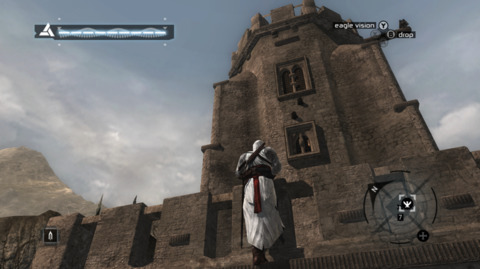
I first played Assassin’s Creed in 2008, about six months after its release. I got about a third of the way through the game before abandoning it for Grand Theft Auto IV, a game I absolutely adored and spent a month making my way through. I always intended to get back to Asssassin’s Creed but I found it kind of boring during my first playthrough and was never compelled to go back, even after the sequel was released and got much better reviews. After a time I knew I’d want to replay from the beginning and really didn’t want to do that, so I let it simmer on my backlog, always intending to play it again and quietly collecting its various sequels when they were on deep discount or via PS+ and Games With Gold giveaways.
On January 1, 2020, I woke up with a headache feeling unmotivated and wanting something low key and maybe even a bit boring to kill time until I felt better. Assassin’s Creed seemed perfect, so I started it up again for the first time in over a decade, and I quickly found my rhythm in the game. A few days later I had rolled credits and while I hadn’t experienced any grand revelations from the story or fallen in love with any of the characters, I did have a decently good time and appreciated the game much more the second time around. I think age has blunted many of my criticisms from the first go round. You don’t expect a 2007 game to have great controls or characterization or anything. You cut it more slack than you do a modern game, and giving Assassin’s Creed the benefit of the doubt in those areas allowed its strengths to work much better.
Assassin’s Creed is a pretty simple story of two men. One is Desmond, a modern everydude from the late Bush administration who perpetually wears the same hoodie and jeans and slouches around the facility where he’s being held prisoner and forced to relive the experiences of his ancestor, Altair, a hotshot assassin in the Holy Land during the third crusade. As Desmond you walk around a small environment and chat with the scientists who are guiding him through the experience, one a kind and fetching young woman and the other an arrogant and kind of nasty, though not outright villainous, older middle-aged guy. You really don’t do all that much, other than have a few conversations, read a few boring emails, and get into the animus, a weird machine that lets you access “ancestral memories” stored in your DNA (It’s really dumb but whatever) and records the past through your perspective.
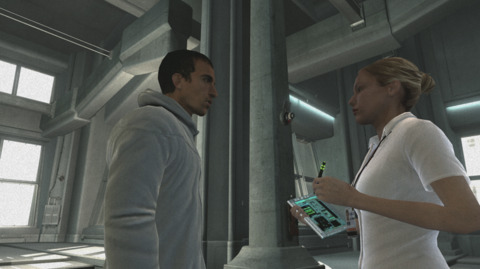
As Altair you actually play the game. At the beginning of the game Altair is kind of an arrogant jerk and gets stripped of his equipment and rank by the boss of the assassin’s guild, and you play him as he earns his way back into the fold by assassinating 9 evil dudes in the cities of Damascus, Acre, and Jerusalem. This is supposed to teach him the importance of the Assassin’s Creed, a set of rules the Assassin’s guild (which hilarious has actual bureaus with its logo in each of the cities) lives by, but which doesn’t really factor into the game much and doesn’t make a whole lot of sense for a set of rules for assassins anyway. There are some plot twists and minor side activities (such as killing Templars, finding flags, which characters in the game are obsessed with, and helping citizens being harassed by guards by murdering those guards) but for the most part it’s pretty straight forward and repetitive. You enter a new section of one of the cities, climb a tower to display icons on part of the map, do one of a few repetitive side missions to gather info on your target, then assassinate your target, rinse and repeat.
Assassin’s Creed is a deeply flawed video game. It has clunky controls, with touchy climbing, stiff combat, and jumping that often sends Altair hurtling into the water or off a rooftop instead of to the obvious foothold he was pointed at. The part of its story set in the modern day is boring and doesn’t even come close to resolving, amounting to little more than a trail of breadcrumbs that, as I understand it, never really got paid off. The part of its story set during the crusades is incredibly cliché and predictable, with paper-thin characters and an unlikable protagonist. The combat is outright bad, relying mostly on standing around and waiting to counter attacks by enemies, who have about 6 different attack patterns they utilize one by one as they encircle Altair. The ‘stealth’ is bare-bones at best, relying primarily on just moving very slowly through a world that’s only really fun to traverse at high speeds. The conversations Altair has with the people he assassinates are very weird in context, since he often kills people in open combat while surrounded by a bunch of their guards, who apparently stop attacking long enough for them to chat and then get back to business after the conversation is over. The objectives you do before each assassination are extremely simple and repetitive, often amounting to the flimsiest excuse for video game busywork. The actual assassinations themselves are quick and simplistic, and very easily devolve into just a bunch of open combat against about a dozen guards. The final boss encounter is just kind of weird. The gameplay rewards you get for finishing missions are minor at best after you get the counter move, which is the most important in the game (and is somehow presented as a piece of ‘equipment’ being restored, even though it’s totally unclear how your master could remove or restore a sword fighting skill, or why he’d want to limit you in that way.) Playing as Desmond is slow and boring, with almost nothing to actually do other than read other people’s email. The game is, overall, kind of a mess.
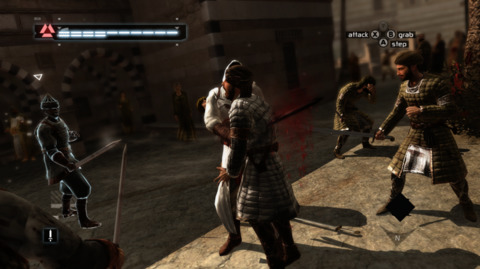
Even more annoying, there are guards and enemies everywhere and if you’re not careful it’s very easy to alert them to your presence, though what actually triggers them is also inconsistent. You can assassinate their friends right next to them without being noticed but if you get too close to them or try to do something they don’t like, like climbing a building or pushing away a beggar who’s harassing you, they attack, alerting their comrades and forcing you to either stand your ground and fight or try to flee and reset their alertness. Neither option is particularly hard, especially later in the game when you’ve gotten more skills and health points, but it can be very annoying because the only really fun thing to do in the game is to parkour and yet the game constantly punishes you for trying it by swarming you with annoying guards. Similarly it gives you a horse to ride in the “kingdom” area connecting your base with the three cities, but asks you to go into super duper slow mode past any guards or they’ll get mad at you for some reason and give chase (The game implies that they recognize Altair from his stupid Assassin outfit, which begs the question of why he wears it given that it’s constantly compromising him and putting him in danger.) This extreme tension between what’s actually entertaining in the game (running and climbing) and what the game seems to want you to do (move very slowly and remain hidden) persists throughout and remains extremely annoying. In addition, Assassin’s Creed has no idea what to do regarding collectibles. It scatters flags throughout all the various open world areas and has 60 identical templars that you can fight if you want to, but you don’t get any real lore or substantial in-game benefit for doing either, which means that the collectibles don’t so much incentivize you to explore the detailed worlds as they add random things to do along the way, grabbing a flag here or killing a templar there if you feel like it. Add that to the mediocre controls and you get a game that often seems to be leaning away from, rather than into its strengths. This was my impression in 2008 as well, so I’m not just looking at it through modern eyes. Assassin’s Creed is clearly a first attempt at a formula that would be improved over the next few iterations, before apparently falling apart and becoming an uneven series during the 2010s.
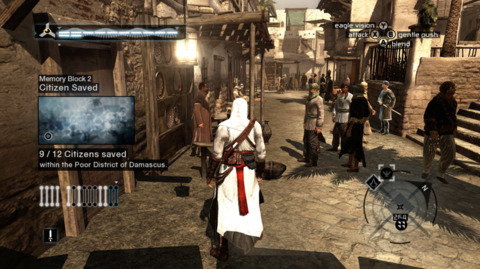
Yet, despite all this, playing through it in 2020 I actually had a pretty good time. Assassin’s Creed does a lot of things badly, but the thing it does well; creating believable and ancient cities that are fun to explore and exist in, it does better than the vast majority of games on the market even today. Assassin’s Creed is saved by its setting; the three cities of Acre, Jerusalem, and Damascus during the Third Crusade. They are each mini-open world maps, divided into three different quarters that unlock as you progress through the stories, and they are fun to traverse and exist in. Assassin’s Creed’s approximation of street life is very 2007, with repeated character models and simple behaviors, but the streets are densely packed and vibrant, full of guards and merchants and thugs and beggars. At times the game can be incredibly immersive, such as when you are following a target and trying to keep a low profile when a beggar charges at you demanding coins and leaving you trying to get around her without arousing the suspicion of your target or the guards. Taking to the rooftops to get around the winding streets or a guard post can also be fun, as can trying to find your way to one of the many lookout points that populate the map. The longer I spent in the world the more I came to appreciate it, and it was that experience that kept me pulled into the game experience during the ~15 hours it took to complete it. It wasn’t just the detail and care put into each location, but also their manageable sizes, easily traversed in just a few minutes either on ground or rooftop, and the fact that the game is built around trying (and mostly succeeding) to make traversal fun and exciting. Unlike so many huge boring open worlds that you need to spend many minutes just commuting from one objective to another (Watch_Dogs, I’m looking at you) Assassin’s Creed invites you to run, climb, and leap your way through compact areas, stumbling upon details and secrets, between tightly packed objectives as you go about your deadly business. It’s also fun and empowering to kill people with the wrist blades and slip into the crowd. Hearing the guards try to investigate behind you as you walk quietly away gives you a sense of power that the game itself comments on at times. Finding vantage points to synchronize with can make for fun, if sometimes frustrating, climbing puzzles. Assassin’s Creed is also a very easy game. You’ll rarely die and when you do checkpointing is very generous. I can’t remember really getting frustrated by the difficulty, though I was often annoyed at how frequently the guards harass and attack you even when you’re minding your own business. Despite those irritations it’s a fun and easy game to just chill with, pecking away at its quests despite their repetition, and the low-key pleasantness of the moment to moment gameplay allows it to transcend its flaws.
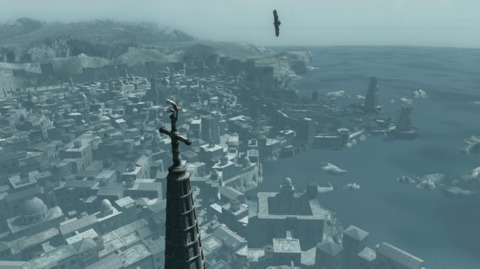
The game also does some relatively fun things with the narrative of the animus, the thing that allows Desmond to relive Altair’s various memories. It’s interesting Altair’s world is filtered through Desmond’s mind and the animus leading to ‘glitches’ and limitations on what Altair can do, and to weird little side issues like the fact that most of the citizens you rescue say one of only a few lines, even though they do so with different voices (presumably because Desmond only remembers the gist of what’s said.) Some of the story beats in the ‘real’ world that tie into this (Desmond is informed that the ‘official’ history of the world isn’t as accurate as he might have thought) are cool too. Overall the story is pretty limited and doesn’t go anywhere, since it’s more interested in laying out bread crumbs than following them but the voice acting is decent and it’s entertaining enough for a video game story circa 2007. In fact the game generally sounds great, with good music and nice street sounds, and the Xbox One X does a good job upscaling the graphics so it looks more like a remaster than a game from 2007, though the washed out color palate of grays and browns does mark it as a game of its particular time (and make it uglier than it has to be.)
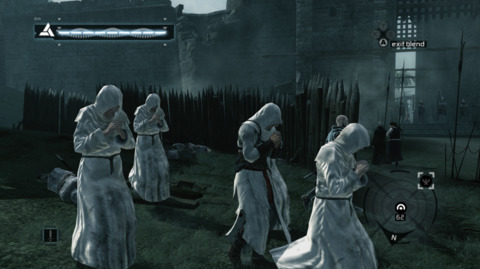
I’ve long told myself that one year I will play through the whole mainline Assassin’s Creed series to get the scope of one of videogame’s most sprawling stories and to get to the later games in the series, which have apparently rebounded in quality from the uneven middle chapters like Assassin’s Creed III and Unity. That’s not going to happen. There’s no way I can devote hundreds and hundreds of hours to one series, and I can tell the Assassin’s Creed’s gameplay will grow stale to me if I try to binge too much of it. By the end of the first game I was already feeling a little antsy, eager to get to the end and move on. But I’m intrigued enough by the apparent jump in quality from the first game to the second that I think I’ll try that next, and I do intend to keep chipping away at the series, not because I think there will be some big narrative pay off (I don’t know what happens but I do know it got a negative reception) but because at least the first game had the kind of open world I enjoy, and taught me something about what gets lost in the expansive open worlds we have today. I’m aware that eventually the games get much bigger and emptier, and I’m interested from a design perspective to see how that happens and how a series that started off very uneven but with a lot of promise went awry and then redeemed itself. I don’t know that I’ll finish all the games if they get really bad, but I do know that I’m interested enough to keep going for now. Assassin’s Creed is a relatively small game that started what is arguably gaming’s largest narrative series, and playing through it in 2020 you can definitely see the seeds of that in the first game, from its incredibly open narrative that obviously planned to spawn sequels to its low-key and forgiving gameplay that serves as a good basis for future worlds and adventures without requiring highly tuned level or encounter design. Ubisoft knew what they were doing when they started this franchise, it was only later that they lost the plot.
